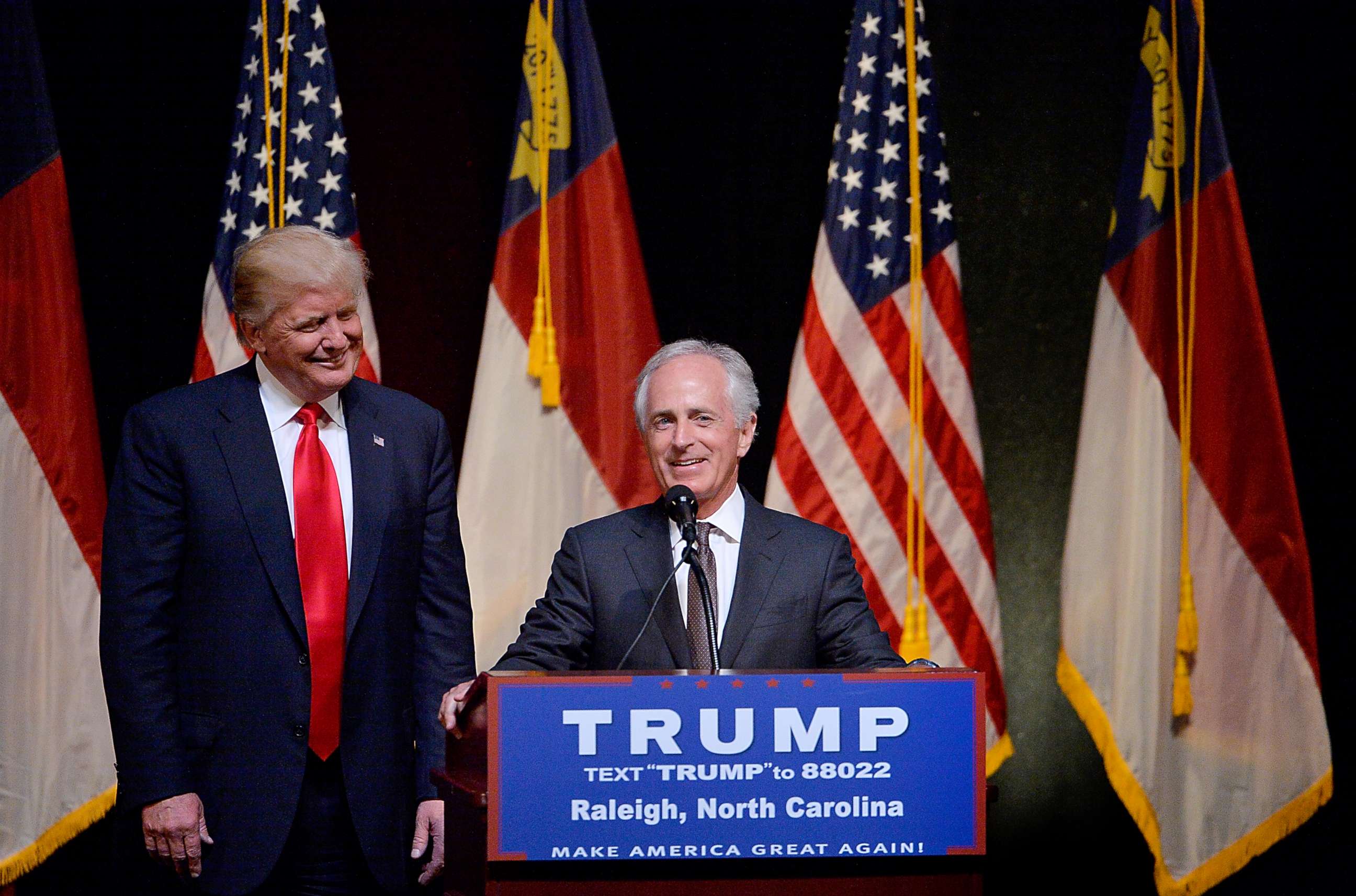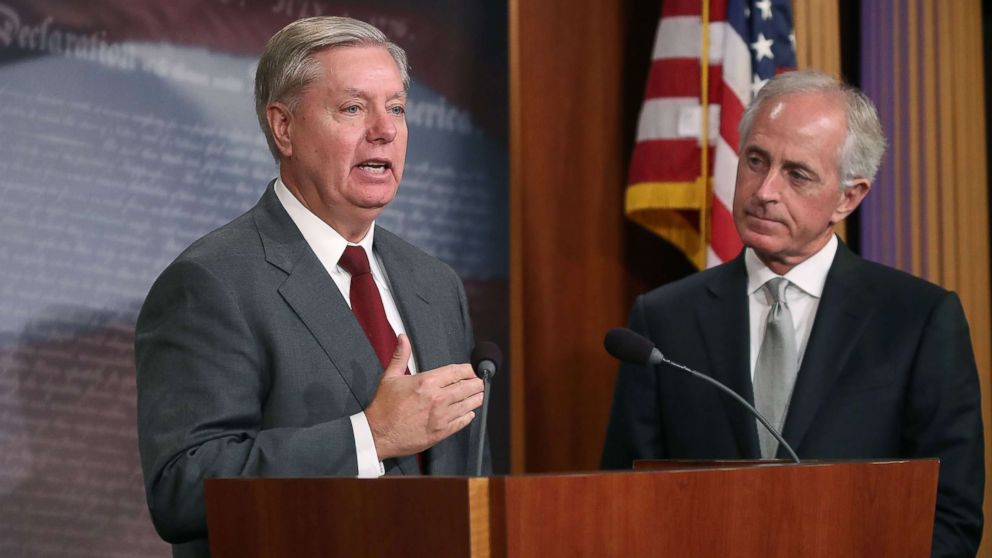How Trump's relationships with Graham, Corker have evolved during first year of presidency
— -- President Donald Trump had no shortage of personal dramas during his first year in office, but he began 2018 with two of the most unlikely friends: his former Capitol Hill rivals and sometimes punching bags, Sens. Lindsey Graham, R-S.C., and Bob Corker, R-Tenn.
Both senators have roller coaster relationships with the mercurial president, and both have chalked up their current friendships to the need to pursue policy goals regardless of personal feelings. But while marriages of convenience are a common part of Washington D.C. relationships, few have seen such drastic twists and turns as Trump’s with the two longtime politicians.
LINDSEY GRAHAM
For five months, Graham was part of the presidential field seeking to best the New York developer. During the campaign, in July 2015, Graham called Trump a “jackass” for insulting his friend and fellow senator John McCain, which prompted Trump to read out Graham’s personal cell phone number at a campaign event.
“He doesn’t seem like a very bright guy,” Trump said at the time.
Graham kept up his criticism of the eventual frontrunner after he dropped out of the presidential race.
“I think he's a kook. I think he's crazy. I think he's unfit for office," Graham said in February 2016, arguing that Republicans would get “slaughtered” if they nominated him.
But once Trump took office, Graham began to modify his critiques and ended the name calling. In April 2017, he said he was “like the happiest dude in America” because of the national security team Trump had put together.
Graham also heaped praise on Trump after he ordered a missile strike against a Syrian airfield after the regime of Bashar al-Assad launched a chemical weapons attack against Syrian civilians.
“Unlike the previous administration, President Trump confronted a pivotal moment in Syria and took action,” Graham said in a joint statement with McCain.
They also started to play golf together, Graham singing Trump’s praises and emphasizing how thoroughly the president, who has shown a clear preference for adulation, outplayed him.
“He beat me like a drum,” Graham said of Trump’s golf game on Oct. 15.
By the end of the year, Trump and Graham’s relationship had done such a 180-degree turn that Graham was criticizing the media for labeling Trump with the exact same term he himself had used earlier in the year.
“What concerns me about the American press is this endless, endless attempt to label the guy as some kind of kook not fit to be president,” Graham said in November. “It’s pretty frustrating for most Republicans, quite frankly, that it’s 24/7 attack on everything the president does or thinks. It gets a little old after a while.”
Asked to explain his apparent change of heart over Trump, Graham never took back the names he had called Trump during the campaign, but said he no longer thinks they apply.
“I said he was a xenophobic, race-baiting, religious bigot. I ran out of things to say. He won,” Graham said during an interview on ABC’s “The View.” “I don't think he's a xenophobic, race-baiting, religious bigot — as president."
Graham has also said his chief goal is to help Trump be a good president, which by Graham’s definition includes pursuing the policies Graham supports.
“I want to help him where I can because there's a lot on this man's plate and we should all want to help him," Graham said in December.

The three-term senator is not always in lockstep with Trump over policy or sentiment, however.
Case in point was a Thursday meeting at the White House, in which Graham and Sen. Dick Durbin, D-Ill., had sought to meet alone with Trump to sell him on their bipartisan, centrist immigration plan. Trump rejected the plan, and reportedly made now-infamous comments to describe his opposition to its visas specifically for people from African nations, asking why the U.S. needed more people from “s--thole” countries.
Graham’s response once those words became public was indicative of his relationship with Trump, one in which he has resorted to quietly steering Trump in what he believes is the right direction, rather than openly and loudly trying to pressure him.
While Durbin quickly confirmed and condemned Trump’s words, Graham eventually released a statement saying he had “said his peace” directly to Trump after the president made the offensive comments.
“The President and all those attending the meeting know what I said and how I feel. I’ve always believed that America is an idea, not defined by its people but by its ideals,” he said.
Tuesday back in the Senate, Graham redirected his criticism, declining to talk more about Trump’s explosive comments but instead focusing on the fact that he completely changed his opinion on the bipartisan immigration deal in the course of a few hours.
“I think somebody on his staff gave him really bad advice between 10 o'clock and 12 o'clock on Thursday,” Graham said.
He also said that while Trump is responsible for his own actions and decisions, it was clear to Graham that someone on the White House staff misled him and encouraged him to change his tune on the bipartisan plan.
BOB CORKER
While Graham has done a 180 in his relationship with Trump, Corker’s has had several more ups and downs. Considered a possible candidate for both vice president and secretary of state during the campaign, Corker appeared onstage with Trump after getting to know him during a Trump Tower visit and over the phone.
“The reason you love him so much is because he loves you,” Corker said during a July 2016 campaign rally, just a few months before the GOP convention. “He loves you, and he wants the best for you.”
Trump returned the praise by calling Corker “a great friend of mine, somebody respected by everybody.”
But their relationship started to yo-yo last spring. Corker was quoted in May as saying the Trump White House was in a “downward spiral” in light of a series of Russia-related scandals, including the reports that Trump had disclosed sensitive information to Russian officials during an Oval Office meeting.
A month after that comment, however, Corker joined Trump and retired NFL star Peyton Manning for a round of golf, suggesting that their friendship had weathered that gray cloud.
The low point in the relationship came during an interview with the New York Times in October, in which Corker said Trump was leading the nation “on the path to World War III.”
This set off a Twitter feud between the two men, with Trump saying Corker decided to retire because he wouldn’t endorse his re-election and calling him “Liddle Bob Corker,” and with Corker responding by calling the White House “an adult day care center.”
Trump also tweeted that Corker “gave us the Iran Deal, & that’s about it,” referencing the July 2015 international agreement with Iran over its nuclear capabilities that Trump clearly meant as an insult. Corker, a key voice on foreign policy as chairman of the Senate Foreign Relations Committee, opposed the deal itself and co-sponsored a successful bill that strengthened congressional oversight of the deal, far from what Trump accused him of doing.
Despite their personal animus, which sometimes played out in public and included policy-related barbs, Corker insists he has maintained a close relationship with the president and other White House officials -- pointing, in fact, to his behind-the-scenes assistance on Iran.
“We have been asked to help them resolve this Iran issue and we’ve been working with them for nine months on that. We never stopped on that,” he told ABC last week.
Corker had raised eyebrows that week when he traveled with Trump on Air Force One to Tennessee to watch the college football championship game, which prompted a new round of are-they-or-aren’t-they questions from political observers.
The Tennessee Republican insisted the chattering class was reading too much into the plane ride as an indication of whether his on-again, off-again friendship with Trump was back on.
"You all act like this is the first time we've hung around,” he said.
Like Graham, Corker said his priority is serving his country.
"I’ve got a job to do,” he added. “I’m the chairman of the Foreign Relations Committee, people in our state expect me to do my job and around the country, and I continue to do it, as have they."
This story is part of a weeklong series examining the first year of the Trump administration.




